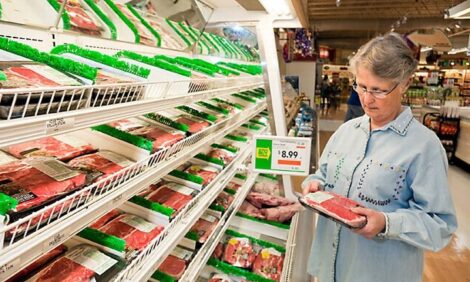



Croatia's Pork Import Restrictions
CROATIA - A Livestock and Products report from the USDA FAS Global Agriculture Information Network (GAIN). In an attempt to protect domestic pork producers, Croatia is applying a number of disease-related import restrictions such as hog cholera, BSE, FMD and T
|
 |
These non-tariff restrictions have resulted in a nine percent drop in the value of imports in 2002. Pork imports in 2002 were valued at $36.2 million with a large portion of imports going to the meat processing industry. U.S. suppliers may not legally export to Croatia because USDA/FSIS has not yet concluded negotiations with the Government of Croatia over export certificates.
Current Situation
Croatian meat processors are importing significant quantities of pork because of shortage in high quality domestic production. Foreign suppliers are preferred because domestic supplies can be unreliable and there are often problems with excess fat. One reason for the lower quality is obsolete breeding technology and outdated genetics. In January 2003, Croatia had surplus of slaughter pigs from small family farms that meat processors do not want to buy (due mostly to excess fat and uneven carcass size).
Croatia's hog sector began a major decline in production starting in 1991 and has never really recovered. Currently domestic pork production meets about 80 percent of market needs. Croatia produces 85 - 90,000 MT of pork per year. Total consumption is estimated at about 110,000 MT per year, with imports accounting for roughly 20,000 MT per year. Per capita consumption of fresh pork in 2001 was about 17.61 kg. Total pork consumption is predicted to grow to 138,000 MT by 2005.
In 2002 Croatia had outbreak of hog cholera in the area of Banija. In a move to help prevent an expansion of the disease imports and transshipments of, pork, pork products, and live pigs from Romania were banned. Also in 2002, Croatia banned imports and transshipments of cattle, sheep, goats, pigs and products because of concerns over FMD.1
On June 10, 2003, imports of live cattle, sheep, goats, hogs, poultry and fish, and products originating from these animals, were band from category I and II countries under the EU’s BSE GBR. This is seen as an obvious attempt by Croatian Government to protect domestic producers from imports. The ban is not applied on shipments from: Austria, Belgium, Denmark, Finland, France, Greece, Republic Ireland, Italy, Luxemburg, Netherlands, Germany, Portugal, Slovenia, Spain, United kingdom, North Ireland (although many of these countries have reported cases of BSE). The ban of import is not applied on shipments of cattle, sheep, goat and products from Bulgaria and Romania. The ban will also not applied in instances where the Croatian Ministry of Agriculture can confirm that the animals in question were not fed with animal proteins.
Exceptions to this rule are fish meal for feed and (except in ruminant feed) milk
and milk products, gelatin that does not originate from ruminant animals and di-calcium phosphates and hydroizolated protein).
Trade
Total pork imports for 2002 were $36.2 million, with the lion’s share also being pork meat for the processing industry that is HS 0203295530 (de boned back) $10.4million and HS 02032915 (breasts with under belly) $ 6.8 million. This is about nine percent drop in the value of imports comparing with 2001. The drop in imports can be explained with disease connected import bans described earlier.
The biggest suppliers of pork for Croatia are: Hungary, Germany, the Netherlands, Denmark, and Austria. U.S. exporters may not currently ship to Croatia in part because there is no negotiated USDA/FSIS meat export certificate. The Croatian government requires trichinosis testing for pork imports despite the fact that freezing has been proven to be an effective control. There are ongoing negotiations between USDA/FAS in cooperation with APHIS and Croatian Ministry of Agriculture to modify the Trichinosis statement that is currently required for pork imports. Some U.S. pork for processing is shipped via ‘unofficial’ channels.
Croatian pork exports are negligible. In 2001 there was no pork exports from Croatia but in the 2002. Croatia exported $218.742 to Italy, Hungary, Holland and Germany. Exports of Croatian pork is blocked because Croatia is not vaccinating pigs for hog cholera, which is mandatory in EU and the fact that EU is afraid of trichinosis in Croatian pork (see HR3003).
The government would like to transform Croatia into a next pork exporter but it has not elaborated on how this goal will be accomplished. There are some indications that they might set the protective price for pork, which would be according to some sources in accordance with the Law on Agriculture.
To view the full report, including tables, please click here
1However, the following countries were exempted: Albania, Australia, Austria, Belgium, Bosnia and Herzegovina, Bulgaria, Cyprus, Czech, Chile, Denmark, Estonia, Finland, France, Greece, Gvajana, Guatemala, Haiti, Honduras, Indonesia, Ireland, Island, Italy, Japan, Canada, Korea, Costa Rica, Cuba, Latvia, Latvia, Luxemburg, Madagascar, Hungary, Macedonia, Malta, Mauritius, Mexico, Netherlands, Norway, New Caledonia, New Zealand, Germany, panama, Poland, Portugal, Romania, Salvador, Singapore, United States of America, Slovakia, Slovenia, Spain, Sweden, United Kingdom, Ukraine, Vanuatu.
USDA - 11th August 2003













